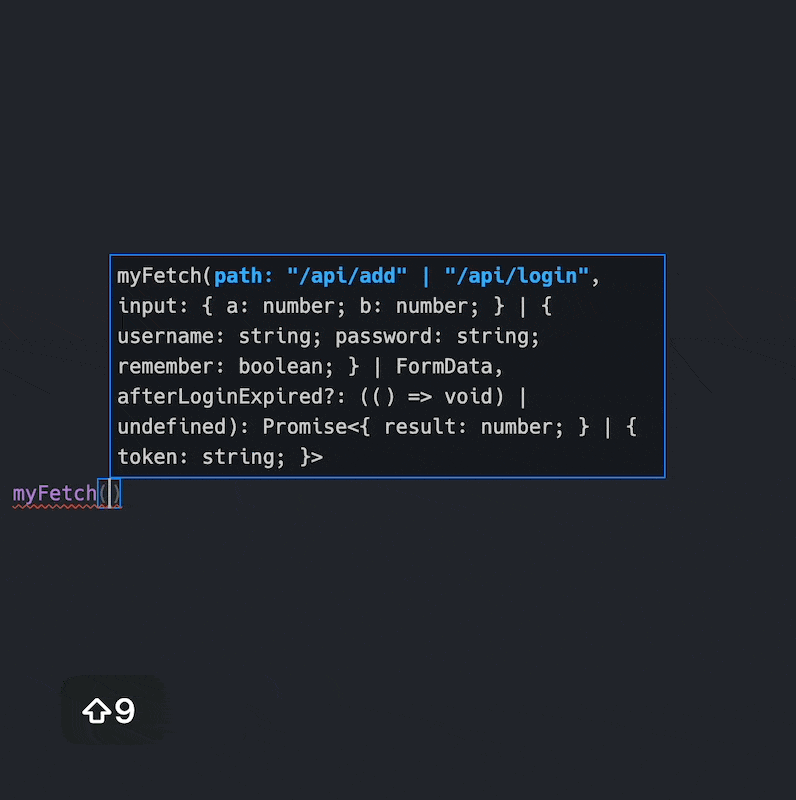前言#
fetch("https://jsonplaceholder.typicode.com/todos/1")
.then((response) => response.json())
.then((json) => console.log(json));
當你直接使用如上的代碼來發起網路請求時,你會發現你的 IDE 無法給你提供任何關於 json 的類型提示。這很合理,沒人知道這個介面會返回什麼格式的資料。於是你需要進行如下幾個步驟:
- 手動測試這個介面,獲取返回值
- 根據返回值的內容,利用如 [transform.tools] 之類的工具生成對應的類型定義
- 將類型定義複製到你的專案中
- 使用
as來標識返回值的類型
這樣下來你也只是能獲得介面正常返回時 json 的類型而已,還有很多問題需要被解決:
- 手動請求得到返回值不夠準確,比如調用介面出錯時,返回值的類型可能會發生變化
- 請求的
url和輸入的參數沒有任何類型提示 - 當後端介面變動時,tsc 無法給出報錯
解決方案的基礎#
ts 中有個非常好用的功能是 as const 斷言,給變數添加這個斷言後,變數的類型會被推斷為更具體的字面量類型,同時會禁止對變數的修改。下面是一個簡單的例子,可以看到 navigateTo 這個函數的參數變得更加安全了,我們不能傳遞一個未被定義的路由名稱字符串。
const routes = {
home: "/",
about: "/about",
} as const;
declare function navigateTo(route: keyof typeof routes): void;
navigateTo("404");
// Argument of type '"404"' is not assignable to parameter of type '"home" | "about"'.
這就是我們能實現類型安全的 fetch 的基礎。
定義路由結構#
首先我們需要定義一個路由結構,這個結構包含了一個介面的全部必要資訊(請求路徑,輸入,輸出,以及可能出現的錯誤碼)。同時這裡我們使用 zod 來進行運行時的資料格式校驗。
// add.ts
import { z } from "zod";
export const path = "/add" as const;
export const input = z.object({
a: z.number(),
b: z.number(),
});
export const data = z.object({
result: z.number(),
});
export const errCode = ["NO_LOGIN"] as const;
定義多個介面之後,在 index.ts 中導出所有的介面。
// index.ts
export * as Add from "./add";
然後我們就能拿到全部的路由資訊
import * as routesWithoutPrefixObj from "./interface/index";
const routesWithoutPrefix = Object.values(
routesWithoutPrefixObj
) as ValueOfObjectArray<typeof routesWithoutPrefixObj>;
定義公共類型#
定義通用返回結構,公共前綴和未知錯誤碼。我們並不是介面直接返回資料,而是返回一個包含了錯誤碼和資料的物件。
const routesWithoutPrefix = Object.values(
routesWithoutPrefixObj
) as ValueOfObjectArray<typeof routesWithoutPrefixObj>;
export const prefix = "/api";
export type Prefix = typeof prefix;
export const unknownError = "UNKNOWN_ERROR" as const;
export type OutputType<T, Err extends readonly string[]> =
| {
err: ArrayToUnion<Err> | typeof unknownError;
data: null;
}
| {
err: null;
data: T;
};
計算出帶前綴的實際路由
export const routes = routesWithoutPrefix.map((r) => {
return {
...r,
path: `${prefix}${r.path}`,
};
}) as unknown as AddPathPrefixForRoutes<typeof routesWithoutPrefix>;
轉換路由結構#
到此為止,我們只是拿到了全部路由物件組成的數組,這對於我們實現類型安全的 fetch 來說並不方便。我們需要將這個數組轉換成一個物件,這個物件的 key 是路由的請求路徑,value 是路由的其它資訊。如此,調用 fetch 時,我們就能獲得更好的補全體驗,在輸入確定的路徑之後,能得到正確的輸入類型和輸出類型。
type RouteItem = {
readonly path: string;
input: z.AnyZodObject;
data: z.AnyZodObject;
errCode: readonly string[];
};
type Helper<T> = T extends RouteItem
? Record<
T["path"],
{
input: z.infer<T["input"]>;
data: z.infer<T["data"]>;
errCode: T["errCode"];
output: OutputType<z.infer<T["data"]>, T["errCode"]>;
}
>
: never;
export type DistributedHelper<T> = T extends RouteItem ? Helper<T> : never;
export type Route = UnionToIntersection<
DistributedHelper<ArrayToUnion<typeof routes>>
>;
如此我們就能得到最終包含全部路由資訊的類型 Route,這個類型的大致結構如下:
type Route = Record<"/api/add", {
input: {
a: number;
b: number;
};
data: {
result: number;
};
errCode: readonly ["NO_LOGIN"];
output: OutputType<{
result: number;
}, readonly ["NO_LOGIN"]>;
}> & Record<"/api/dataSet/delDataSet", {
...;
}> & ... 13 more ... & Record<...>
為 fetch 添加類型#
可以看到,只需要約束 fetch 的第一個參數 path 為 keyof Route,第二個參數為對應路由的輸入類型,就能得到正確的輸出類型。為了實現上的簡單,所有的 http 請求都使用 POST 方法,所有的輸入參數都從 body 中傳遞。
export const myFetch = async <Path extends keyof Route>(
path: Path,
input: Route[Path]["input"]
) => {
try {
const res = await fetch(path, {
method: "POST",
headers: headers,
body: input instanceof FormData ? input : JSON.stringify(input),
});
const data = await (res.json() as Promise<Route[Path]["output"]>);
if (data.err) {
throw new CustomError(data.err);
}
return data.data as Route[Path]["data"];
} catch (err) {
if (err instanceof CustomError) {
throw err;
}
if (err instanceof Error) {
throw new CustomError(err.message);
}
throw new CustomError(unknownError);
}
};
class CustomError<T extends string> extends Error {
errorCode: T;
constructor(msg: string) {
super(msg);
Object.setPrototypeOf(this, CustomError.prototype);
this.errorCode = msg as T;
}
}
nice,讓我們來看看使用效果吧。

最後#
文章寫到這裡就算是結束了,取決你自己的需求,你還可以做如下事情:
- 將它和 use